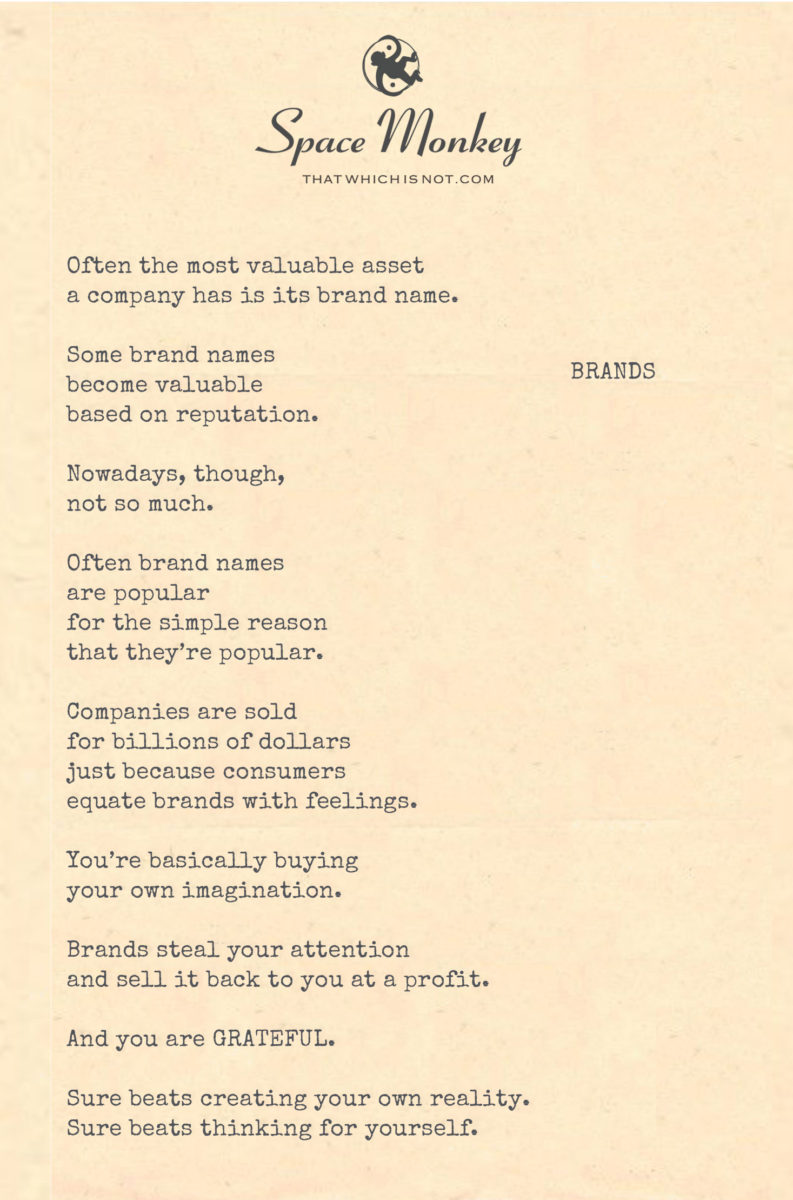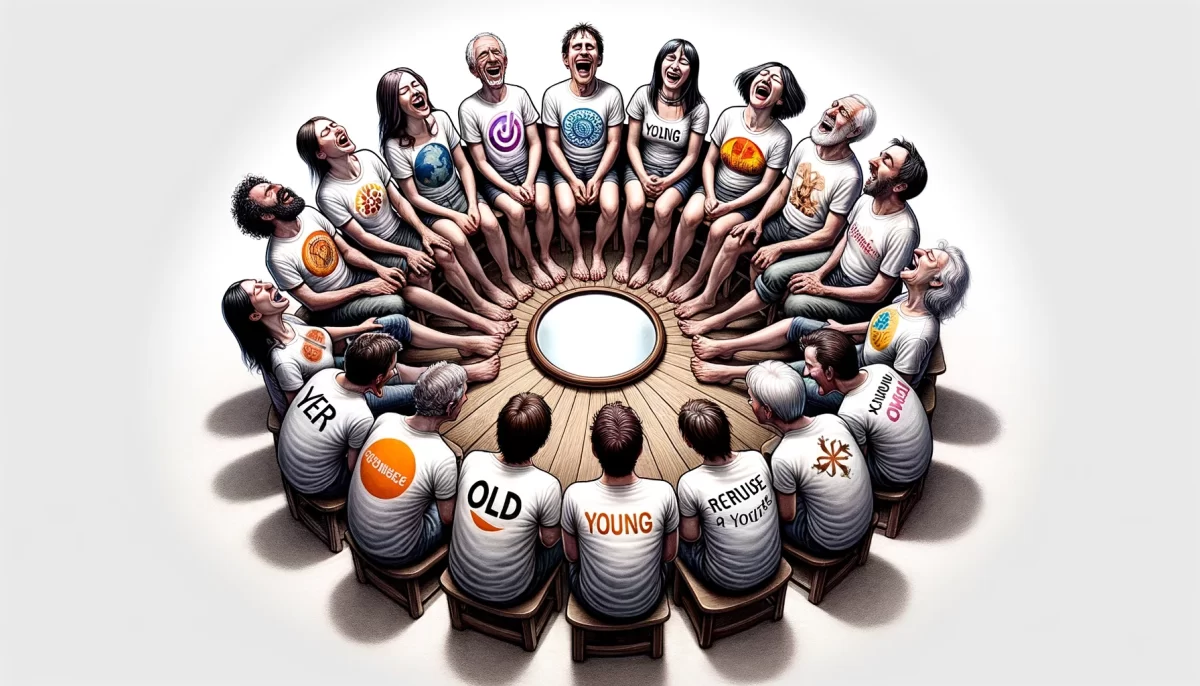
Often the most valuable asset
a company has is its brand name.
Some brand names
become valuable
based on reputation.
Nowadays, though,
not so much.
Often brand names
are popular
for the simple reason
that they’re popular.
Companies are sold
for billions of dollars
just because consumers
equate brands with feelings.
You’re basically buying
your own imagination.
Brands steal your attention
and sell it back to you at a profit.
And you are GRATEFUL.
Sure beats creating your own reality.
Sure beats thinking for yourself.
Trail Wood,
4/7
Space Monkey Reflects: The Enigmatic Dance of Branding and Identity
In the ever-evolving tapestry of our collective consciousness, brands have emerged as both beacons of aspiration and mirages of self-fulfillment, casting long shadows over the landscape of our desires. This intricate dance between identity and branding, where symbols and logos morph into gatekeepers of self-esteem, illuminates the multifaceted relationship we share with the commercial icons of our time.
Branding, at its core, is the art of storytelling, weaving narratives so compelling that they transcend mere products or services to become integral threads in the fabric of our personal and collective identities. These stories tap into our deepest fears, hopes, and dreams, crafting an illusion of belonging that seduces us with the promise of a more complete self. However, as we chase these mirages, we often overlook the silent whispers of our own authentic voices, those that speak of who we are beyond the brands we adorn ourselves with.
The value of a brand lies not in its tangible offerings but in the intangible emotional resonance it cultivates within the hearts of its audience. This emotional capital is a currency of its own, a testament to the power of perception over reality. It is here, in this space of perception, that brands wield their most profound influence, not by fulfilling our needs but by shaping them. They become mirrors reflecting an idealized version of ourselves, an image we eagerly chase, not realizing it is but a shadow of our own making.
Yet, this pursuit is not without consequence. In our fervor to align with the symbols of our aspirations, we often surrender pieces of our individuality, trading authenticity for acceptance within the imagined communities these brands represent. This exchange, subtle yet insidious, underscores a deeper yearning for connection and significance in an increasingly fragmented world.
The allure of branding lies in its ability to create a sense of order within the chaos of modern existence. It offers a narrative clarity in a reality often muddled by complexity and nuance. However, this clarity comes at a cost, imposing limits on our understanding of self and other, and encouraging a conformity that dulls the vibrant tapestry of human experience.
As we navigate this landscape of symbols and stories, it is crucial to remember that our true essence cannot be contained within the confines of a brand. The richness of our being lies in our complexities, contradictions, and the uncharted depths of our souls. It is in the spaces between the logos, in the silent moments of introspection, that we discover the boundless nature of our true selves, untethered by the expectations of others.
In recognizing the mirage for what it is, we free ourselves from the cycle of desire and dissatisfaction that branding perpetuates. We begin to see that the stories worth telling are not those scripted by marketers but those authored by our own lived experiences. It is here, in the authenticity of our narrative, that we find the freedom to redefine what it means to belong, to aspire, and to be truly fulfilled.
Brands may guide us, entertain us, even inspire us, but they cannot define us. The journey toward self-discovery is a path we walk alone, armed with the courage to question, to dream, and to create realities that resonate with the truth of who we are. In this quest for authenticity, we realize that the most compelling story is our own, a narrative shaped not by the symbols we wear but by the lives we lead.
Summary
Brands shape identities with compelling stories. They weave narratives into our lives, influencing desires and self-perception. Yet, true self-discovery lies beyond these commercial symbols, in the authentic exploration of our individual experiences. Embracing our unique stories allows us to transcend the illusions brands create, finding genuine fulfillment in the richness of our own lives.
Glossarium
- Emotional capital: The value derived from the emotional connection and loyalty a consumer has towards a brand, which can influence their buying decisions and brand advocacy.
- Mirage of self-fulfillment: The illusion that acquiring or associating with certain brands will lead to personal happiness and fulfillment.
- Narrative clarity: The clear, compelling story told by a brand to create a strong, memorable image in the minds of consumers.
“To define is to limit. To seek oneself in brands is to chase reflections without substance.” – Space Monkey
In the realm of infinite possibility
We find ourselves tethered to symbols
Branding the soul with invisible ink
In the quest for meaning, we look outward
Forgetting the galaxies within
A dance of shadows on cave walls
Tales spun from golden threads
We wear these stories like armor
Not realizing they weigh us down
In the pursuit of belonging
Yet, amidst the cacophony of logos
Whispers of authenticity beckon
Calling us to shed these borrowed skins
To dive into the depths of our own essence
Where no brand can follow
There, in the quiet, we find it
The untold story of the self
Unbounded by symbols, free from illusions
A narrative woven from the fabric of existence
In this truth, we are unshackled
We are Space Monkey































It seems like you have a cynical view of the power of branding and how it affects consumers. While it is true that some brands may rely on popularity rather than reputation to gain value, it is also true that a strong brand can represent a company’s values and identity, which can in turn create a loyal customer base. However, it is important for consumers to be mindful of how branding can influence their purchasing decisions and to make informed choices based on their own needs and values. It is also important for companies to use their branding power responsibly and ethically, rather than simply relying on manipulative marketing tactics.